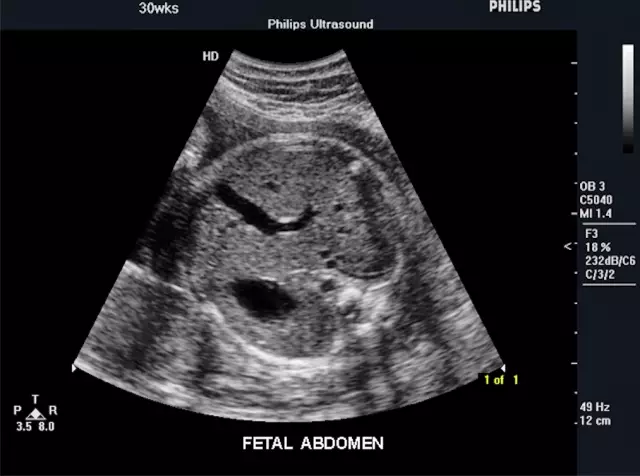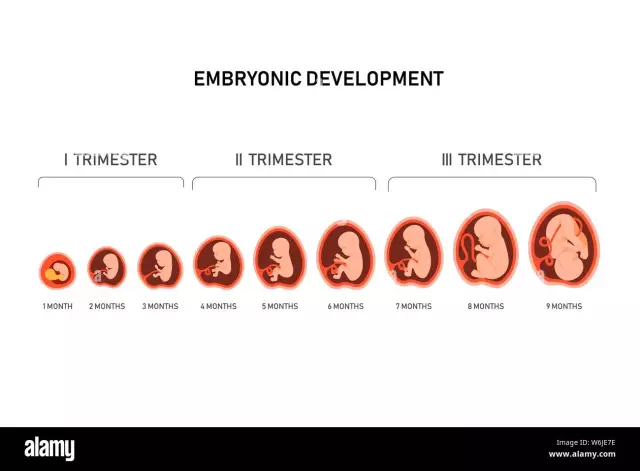- Author Rachel Wainwright wainwright@abchealthonline.com.
- Public 2023-12-15 07:39.
- Last modified 2025-11-02 20:14.
41 weeks pregnant

At 41 weeks, pregnancy is not yet considered delayed, it can simply be prolonged. The onset of labor depends on a number of factors - on the age of the mother and her hormonal status, on the characteristics of her menstrual cycle and the time of ovulation, on the state of health of the pregnant woman and heredity. Most likely, if there is no delivery at 41 weeks of pregnancy, then its term was incorrectly determined, that is, fertilization occurred later than the expected date of conception. Pregnancy is usually considered to be 40 weeks long, but deviations of 2 weeks up or down are normal.
Changes in the fetus
The baby is fully ripe to live outside the mother's belly. It is already quite cramped in the uterine cavity, but it continues to grow, albeit somewhat slower than before. The length of the fetus from crown to heels at 41 weeks of gestation can reach 54 cm or more, weight 3500 g or more.
The fetus lives in its own rhythm, at 41 weeks of gestation, it sleeps a lot, and actively moves during wakefulness. When the baby moves in the uterus, the delivery of oxygen and nutrients to it is activated. A woman at 41 weeks pregnant must necessarily control the activity of the baby's movements in the abdomen, and now take this with great attention.
The baby's skin, if he is born at 41 weeks of gestation or later, may look dry and a little pale after birth, cracks and various peeling easily appear on it.
The fetal brain is now well developed, so it has never been more sensitive to a lack of oxygen. The placenta is aging, and because of this, it does not cope with its tasks worse.
At 41 weeks of gestation, the deposition of calcium salts in the bones continues, they become denser and less flexible, which can make it difficult for the head to pass through the birth canal.

One of the dangers of prolonged pregnancy is that, against the background of aging of the placenta, the supply of oxygen to the fetus decreases, and it may experience hypoxia. Against the background of hypoxia, the muscle that squeezes the rectum relaxes, and meconium is released into the amniotic fluid. Also, hypoxia causes premature breaths before the birth of the child with the opening of the glottis and the ingress of meconium into the respiratory tract of the fetus. Most often, meconium aspiration occurs precisely during post-term pregnancy.
Changes in a woman's body at 41 weeks of gestation
At 41 weeks of gestation, labor is just around the corner. Before this time, the woman most likely already experienced training contractions, and she is familiar with the feeling that happens when the stomach hurts at 41 weeks of pregnancy. The onset of labor is indicated by the fact that contractions have become more frequent, and regularity has been outlined in their occurrence.
Most likely, the stomach has already sunk, this can be determined by the height of the fundus and the new sensations of the pregnant woman. After the head of the fetus sank into the small pelvis, it becomes easier to breathe, belching and heartburn disappear.
Sometimes, before childbirth, the sacrum or tailbone begins to hurt, and there is a pulling sensation in the groin.
Watery discharge at 41 weeks gestation is similar to amniotic fluid. The discharge of amniotic fluid can occur both rapidly and gradually, when water is released in small portions. Leakage of water is observed when the integrity of the fetal bladder is violated high enough, from the side.
Abundant mucous discharge at 41 weeks of gestation occurs when the cervix is freed from the mucous plug. The cork mucus resembles an egg white in consistency and is sometimes pink or cream colored. Abundant bleeding from the vagina against the background of a stomach ache at 41 weeks of gestation sometimes accompanies placental abruption, which can threaten the life of the fetus.
YouTube video related to the article:
Found a mistake in the text? Select it and press Ctrl + Enter.






